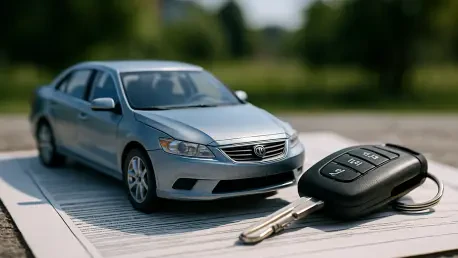What happens when a rideshare driver, a motorcyclist, and an uninsured pedestrian collide on a busy Detroit street, leaving medical bills piling up with no clear path to coverage? This chaotic scenario plays out daily across Michigan, where auto insurance disputes have long frustrated residents, and House Bill No. 5298, introduced on November 13, 2025, aims to cut through the confusion surrounding Personal Injury Protection (PIP) benefits, promising a seismic shift in how accident claims are handled. With premiums among the highest in the nation, the stakes couldn’t be higher for Michiganders desperate for clarity and relief.
This legislative push isn’t just about tweaking fine print—it’s a direct response to a broken system that leaves victims waiting months for benefits while insurers argue over responsibility. The bill, currently under review by the Committee on Insurance, tackles complex cases involving multiple policies, rideshare vehicles, and uninsured individuals. Its potential to redefine fairness and efficiency in Michigan’s unique no-fault insurance framework makes it a story worth following for every driver, passenger, and employer in the state.
Why Michigan’s Insurance Rules Are Making Headlines
Michigan has long grappled with an auto insurance system that’s as notorious for its complexity as it is for its cost. Drivers in the state pay some of the highest premiums nationwide, with a 2025 study by Insure.com estimating average annual costs at over $2,500—nearly double the national average. The root of much frustration lies in PIP benefits, which cover medical expenses and lost wages after an accident, often sparking disputes when coverage isn’t clear.
Beyond the financial burden, the current rules struggle to keep pace with modern realities like rideshare services and shared mobility. A single accident involving a commercial vehicle can tangle multiple insurers in a web of liability questions, delaying relief for those injured. House Bill No. 5298 steps into this fray with a bold aim to simplify claims and ensure quicker access to benefits.
The urgency of reform hits home for many. Stories of families facing bankruptcy due to uncovered medical costs after crashes highlight a system in dire need of change. This bill isn’t just legislation—it’s a lifeline for countless residents caught in bureaucratic limbo.
The Heart of PIP Reform: Why It Impacts Everyone
At its core, PIP reform matters because it touches nearly every Michigander who steps into a vehicle or crosses a street. Under the state’s no-fault system, PIP benefits are meant to provide immediate support regardless of who caused an accident, but gaps in clarity often derail this promise. When multiple policies overlap or uninsured parties are involved, the process grinds to a halt.
Consider the case of a Grand Rapids rideshare driver injured in a collision last year. With both personal and commercial policies in play, the claim process stretched over eight months, leaving bills unpaid and stress mounting. Such delays ripple outward, affecting employers, passengers, and even healthcare providers waiting for compensation.
House Bill No. 5298 seeks to address these pain points by redefining who pays and when. By focusing on equitable access to benefits, the legislation could reshape how accident victims recover, both financially and physically, making it a critical issue for the state’s diverse road users.
Unpacking the Key Reforms in House Bill No. 5298
The proposed changes in the bill target ambiguity head-on with structured updates to insurer responsibilities. For individuals named on a policy, along with their spouse or household relatives, the primary insurer must cover PIP benefits up to the policy limit without dragging other providers into disputes. This cuts down on the back-and-forth that often delays relief.
Specific scenarios like rideshare or commercial vehicle accidents get clear guidelines: the vehicle’s insurer takes primary responsibility, with exceptions for passengers in school buses or taxicabs who may fall under different rules. Motorcycle crashes involving motor vehicles now follow a strict hierarchy—starting with the motor vehicle’s insurer and moving down a priority list—while uninsured individuals can access the assigned claims plan as a safety net.
In cases of multiple policies at the same level, benefits are capped at the highest available limit, and insurers can partially recoup costs to balance the load. These provisions aim to streamline claims while adapting to modern transport trends, ensuring no one slips through the cracks in complex accidents.
Voices from the Frontlines: Perspectives on the Bill
Representative Mike Harris, a key sponsor, underscored the bill’s intent in a recent press conference: “Michiganders shouldn’t have to fight for benefits after a crash. This is about getting help fast, not filling out endless forms.” His co-sponsor, Jason Morgan, echoed the sentiment, pointing to the need to modernize rules for rideshare realities while safeguarding all road users.
Insurance industry analysts offer measured support, with one expert from Lansing estimating that clearer rules could slash litigation costs by as much as 15% in tangled cases. Yet, not all feedback is glowing—some smaller insurers worry about bearing disproportionate costs under the new recoupment structure, potentially raising premiums for niche policyholders.
Drivers themselves bring raw insight to the debate. A Kalamazoo motorcyclist, still recovering from a collision earlier this year, shared how unclear PIP rules left him without wage replacement for months: “I nearly lost everything waiting for answers. If this bill fixes that, it’s worth fighting for.” These personal accounts fuel the urgency behind the reforms.
Preparing for Change: Steps Michiganders Can Take Today
While the bill awaits further legislative action, proactive steps can help residents brace for potential shifts in PIP rules. Begin by diving into current policy details—understand the limits of PIP coverage and whether any opt-outs apply under Michigan’s no-fault options. This knowledge is crucial for spotting gaps before an accident strikes.
For rideshare drivers or frequent users of commercial transport, verifying insurer policies on such scenarios is key, as the bill prioritizes vehicle insurers in these cases. Uninsured individuals should explore the assigned claims plan, a fallback for medical costs if no other coverage exists. Staying updated on the bill’s progress through state legislative channels or local news also ensures readiness for any amendments.
Taking action now isn’t just about preparation—it’s about empowerment. With potential changes looming from 2025 to 2027 as the bill moves through committees, knowing where one stands can transform a confusing claims process into a manageable one. Awareness today could mean faster recovery tomorrow.
Reflecting on a Path Toward Clarity
Looking back, the journey of House Bill No. 5298 stood as a testament to Michigan’s resolve to tackle a deeply flawed auto insurance system. It brought to light the struggles of countless residents—from rideshare drivers to uninsured pedestrians—whose lives had been upended by delayed or denied benefits. The bill’s framework, with its focus on clear insurer roles and modern transport challenges, offered a glimpse of a more equitable future.
As discussions unfolded, the next steps became clear: lawmakers needed to refine the balance between insurer costs and victim relief, ensuring premiums didn’t spike as a byproduct of reform. Michiganders, too, had a role—staying engaged with legislative updates and advocating for fair outcomes proved vital. Beyond immediate fixes, the push for PIP reform sparked broader questions about adapting insurance to an ever-changing world, setting the stage for ongoing innovation in how safety nets are built.









